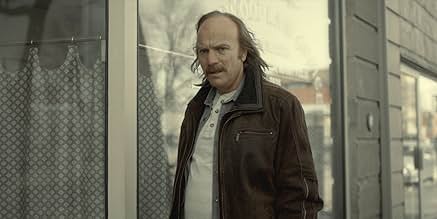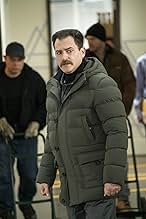The Principle of Restricted Choice
- Episode aired Apr 26, 2017
- TV-MA
- 52m
IMDb RATING
8.0/10
6.3K
YOUR RATING
Gloria deals with the aftermath of the crime, Varga makes a move, and Ray and Nikki move on to their next plan.Gloria deals with the aftermath of the crime, Varga makes a move, and Ray and Nikki move on to their next plan.Gloria deals with the aftermath of the crime, Varga makes a move, and Ray and Nikki move on to their next plan.
Featured reviews
What how intrigued me for the third time in this series is that you have an incredible confluence of really bad people. Mixed in are the dullards and the overblown egos that think they have some control. We have those Ukrainians running the show like something out of Kafka, the brothers facing off, never really seeing each other. Then there's that psychotic woman. And, we know that the female police officer really knows her stuff and will be stifled by the hot shot police chief. The parking lot kings get moved in on and will potentially become billionaires. On paper. But a lot is still in the dark, so we get the great opportunity to see how all this gets intertwined. Once again, excellent cinematography, maybe the best on television.
I like this series, very interesting to watch.
I watched first and second season and it's one best series so far.
But, what pissed me off In the third season - is having a character Yurii Gurka, which is from Ukraine, and putting a russian music when he appears in the parking scene... "well done", "bravo".
I don't like Ukrainian character being shown as crime element and evil, but when you decided to do it, at least, make it right. Dig a little deeper, it really shows you dont know the sibject.
Otherwise, what is the purpose in doing this? Do you want to show Ukrainans and russians being same and equal, or what? Awful, very disappointed.
I watched first and second season and it's one best series so far.
But, what pissed me off In the third season - is having a character Yurii Gurka, which is from Ukraine, and putting a russian music when he appears in the parking scene... "well done", "bravo".
I don't like Ukrainian character being shown as crime element and evil, but when you decided to do it, at least, make it right. Dig a little deeper, it really shows you dont know the sibject.
Otherwise, what is the purpose in doing this? Do you want to show Ukrainans and russians being same and equal, or what? Awful, very disappointed.
So hard to follow. Actors are not as engaging as the first 2 seasons. Also the soundtrack has just disappeared for some reason. Not enjoying this at all
Suddenly a character appears (vm Vargas ) and starts to threaten a businessman and his lawyer , to be a partner...and these idiots gets scared and allow this Vargas and his goons into his office , even after this gang killed someone... The creators of this series says this is a true story but felt so Annoying by see these unbelievable and idiotic characters ...
"The Principle of Restricted Choice," the second episode of Fargo's third season, directed by Michael Uppendahl and written by Noah Hawley, builds upon the intricate narrative foundation laid in the premiere, deepening character conflicts and expanding thematic complexity. The episode's title, drawn from a bridge-playing theory about probabilities and decision-making, cleverly mirrors the characters' constrained options and the consequences of their choices, reinforcing the season's ongoing exploration of identity, deception, and the elusive nature of truth.
The episode continues to focus on the fraught relationship between brothers Emmit and Ray Stussy, both portrayed with remarkable versatility by Ewan McGregor. Ray, still grappling with envy and resentment over a past inheritance dispute, seeks to mend fences with Emmit, only to be thwarted by misunderstandings and escalating tensions. McGregor's dual performance captures the nuanced contrasts between Emmit's polished, successful exterior and Ray's frustrated, desperate demeanor. Their interactions, framed by the symbolic presence of Ray's inherited Corvette, underscore the themes of rivalry and fractured family ties.
Ray's girlfriend Nikki Swango (Mary Elizabeth Winstead) injects energy and wit into the narrative, her sharp intelligence and bridge obsession providing both comic relief and narrative propulsion. Nikki's plan to steal a valuable stamp from Emmit's collection-an heirloom central to the brothers' conflict-adds a layer of intrigue and dark humor. The episode's depiction of her break-in, complicated by Emmit's unexpected moves, highlights the season's blend of suspense and absurdity. Winstead's performance is compelling, balancing toughness with vulnerability, and her scenes with Sy Feltz (Michael Stuhlbarg) offer moments of levity amid the tension.
Law enforcement's perspective is embodied by Gloria Burgle (Carrie Coon), whose investigation into the murder of Ennis Stussy progresses amid challenges both professional and personal. Gloria's aversion to modern technology-exemplified by her struggles with malfunctioning automatic doors and reliance on a phonebook-adds a layer of thematic texture, symbolizing the tension between old and new, order and chaos. Coon's portrayal imbues Gloria with a grounded humanity, making her a relatable and sympathetic figure navigating a complex and often indifferent world.
The episode also introduces the enigmatic and unsettling V. M. Varga (David Thewlis), whose linguistic posturing and menacing presence foreshadow his growing influence over Emmit's business affairs. Varga's manipulation and the looming threat he represents add a layer of corporate and existential menace, contrasting with the more personal conflicts among the Stussys. Thewlis's performance is magnetic, blending charm and menace in a way that commands attention.
"The Principle of Restricted Choice" employs a subdued color palette and meticulous cinematography by Dana Gonzales, capturing the cold, muted tones of the Minnesota winter and the claustrophobic interiors that reflect the characters' psychological states. The editing maintains a deliberate pace, balancing character moments with plot development, while Jeff Russo's score subtly underscores the episode's tonal shifts.
Thematically, the episode delves into the constraints of choice and the ripple effects of decisions, paralleling the bridge metaphor in its narrative structure. The characters' attempts to navigate limited options amid deception and misunderstanding highlight the season's meditation on fate, identity, and the construction of reality. The episode's humor, often arising from misunderstandings and character quirks, balances the darker elements, maintaining Fargo's signature tonal blend.
Critically, the episode was well received, with praise for its writing, performances-particularly McGregor, Winstead, and Coon-and its thematic ambition. Some critics noted that the episode's pacing was slower compared to the premiere but acknowledged that this allowed for richer character development and narrative layering.
"The Principle of Restricted Choice" is a thoughtful and engaging episode that advances Fargo's third season with narrative sophistication and emotional depth. Through compelling performances, evocative direction, and layered storytelling, it immerses viewers in a world where choices are constrained, identities are fluid, and truth is elusive.
The episode continues to focus on the fraught relationship between brothers Emmit and Ray Stussy, both portrayed with remarkable versatility by Ewan McGregor. Ray, still grappling with envy and resentment over a past inheritance dispute, seeks to mend fences with Emmit, only to be thwarted by misunderstandings and escalating tensions. McGregor's dual performance captures the nuanced contrasts between Emmit's polished, successful exterior and Ray's frustrated, desperate demeanor. Their interactions, framed by the symbolic presence of Ray's inherited Corvette, underscore the themes of rivalry and fractured family ties.
Ray's girlfriend Nikki Swango (Mary Elizabeth Winstead) injects energy and wit into the narrative, her sharp intelligence and bridge obsession providing both comic relief and narrative propulsion. Nikki's plan to steal a valuable stamp from Emmit's collection-an heirloom central to the brothers' conflict-adds a layer of intrigue and dark humor. The episode's depiction of her break-in, complicated by Emmit's unexpected moves, highlights the season's blend of suspense and absurdity. Winstead's performance is compelling, balancing toughness with vulnerability, and her scenes with Sy Feltz (Michael Stuhlbarg) offer moments of levity amid the tension.
Law enforcement's perspective is embodied by Gloria Burgle (Carrie Coon), whose investigation into the murder of Ennis Stussy progresses amid challenges both professional and personal. Gloria's aversion to modern technology-exemplified by her struggles with malfunctioning automatic doors and reliance on a phonebook-adds a layer of thematic texture, symbolizing the tension between old and new, order and chaos. Coon's portrayal imbues Gloria with a grounded humanity, making her a relatable and sympathetic figure navigating a complex and often indifferent world.
The episode also introduces the enigmatic and unsettling V. M. Varga (David Thewlis), whose linguistic posturing and menacing presence foreshadow his growing influence over Emmit's business affairs. Varga's manipulation and the looming threat he represents add a layer of corporate and existential menace, contrasting with the more personal conflicts among the Stussys. Thewlis's performance is magnetic, blending charm and menace in a way that commands attention.
"The Principle of Restricted Choice" employs a subdued color palette and meticulous cinematography by Dana Gonzales, capturing the cold, muted tones of the Minnesota winter and the claustrophobic interiors that reflect the characters' psychological states. The editing maintains a deliberate pace, balancing character moments with plot development, while Jeff Russo's score subtly underscores the episode's tonal shifts.
Thematically, the episode delves into the constraints of choice and the ripple effects of decisions, paralleling the bridge metaphor in its narrative structure. The characters' attempts to navigate limited options amid deception and misunderstanding highlight the season's meditation on fate, identity, and the construction of reality. The episode's humor, often arising from misunderstandings and character quirks, balances the darker elements, maintaining Fargo's signature tonal blend.
Critically, the episode was well received, with praise for its writing, performances-particularly McGregor, Winstead, and Coon-and its thematic ambition. Some critics noted that the episode's pacing was slower compared to the premiere but acknowledged that this allowed for richer character development and narrative layering.
"The Principle of Restricted Choice" is a thoughtful and engaging episode that advances Fargo's third season with narrative sophistication and emotional depth. Through compelling performances, evocative direction, and layered storytelling, it immerses viewers in a world where choices are constrained, identities are fluid, and truth is elusive.
Did you know
- TriviaEmmitt (Ewan McGregor) says a transaction should be run by Stan Grossman. Stan Grossman is a character from the movie Fargo (1996).
- GoofsWhen Irv is looking at his computer screen and trying to search for VM Varga, his browser address is Google.ca, not Google.com, revealing he is accessing the Internet via a Canadian Internet provider. The series was filmed in Alberta.
Google is not an Internet Service Provider. It is a browser. Google.ca is for looking up Canadian information without unwanted results from other countries. Anybody can use it. It is not specifically for or by Canada.
- Quotes
Irv Blumkin: You borrowed $1,000,000 from a man without knowing his first name.
Emmit Stussy: I know how it...
Irv Blumkin: It's not a question... I'm just assessing the level of stupidity.
- ConnectionsReferences Fargo (1996)
Details
- Runtime
- 52m
- Color
- Sound mix
- Aspect ratio
- 1.78 : 1
- 2.00 : 1
Contribute to this page
Suggest an edit or add missing content



























